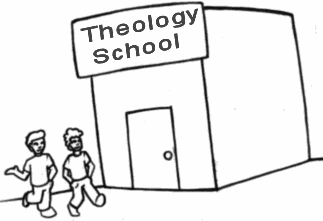Some theistic religions are: Hinduism, Christianity, Judaism, Zoroastrianism, Bahá'í Faith, Sikhism and Islam.
Some atheistic religions are: Confucianism and Buddhism.
There are (or were) other religions which are polytheistic (see below). Relationship to religion
 Theism
TheismPolytheism is the belief that there is more than one deity. In practice, polytheism is not just the belief that there are multiple gods; it usually includes belief in the existence of a specific pantheon of distinct deities.
Within polytheism there are hard and soft varieties.
Hard polytheism views the gods as being distinct and separate beings; an example of this would be ancient Greek Mythology.
Soft polytheism views the gods as being subsumed into a greater whole. Most forms of Hinduism serve as examples of soft polytheism. Polytheism
Monotheism is the belief that there is only one deity. There are many forms of monotheism.
Inclusive monotheism: The belief that there is only one deity, and that all other claimed deities are just different names for it. The Hindu denomination of Smartism is an example of inclusive monotheism.
Exclusive monotheism: The belief that there is only one deity, and that all other claimed deities are distinct from it and false — either invented, demonic, or simply incorrect. Most Abrahamic religions, and the Hindu denomination of Vaishnavism (which regards the worship of anyone other than Vishnu as incorrect) are examples of exclusive monotheism.
Pantheism: The view that the universe is identical to a deity.
Panentheism: The belief that the universe is entirely contained within a deity that is greater than just the universe and beyond. Monotheism
Deism is the belief in god or deity based on reason. It typically rejects supernatural events (prophecy, miracles) and divine revelation prominent in organized religion, along with holy books and revealed religions that assert the existence of such things. Instead, Deism holds that religious beliefs must be founded on human reason and observed features of the natural world, and that these sources reveal the existence of a supreme being as creator.
 Atheism
AtheismThe word "agnostic" was coined by T. H. Huxley, "Darwin's Bulldog," around 1869. Since then, the word has been used in a variety of ways, as follows.
In one sense of the word, agnosticism is the position that it is not possible to know whether gods exist. Agnosticism in this sense is an epistemological position about the limits of possible knowledge. It holds that it is not possible to determine whether gods exist. Specifically, it holds that the question of the existence of gods is beyond the scope of science — that it is a question that cannot be answered by science. This position is epistemological agnosticism or strong agnosticism.
he takes no position, pro or con, on the existence of gods.
he has considered the question of the existence of gods, and has not yet been able to decide whether he believes in the existence of gods or not.
No comments:
Post a Comment